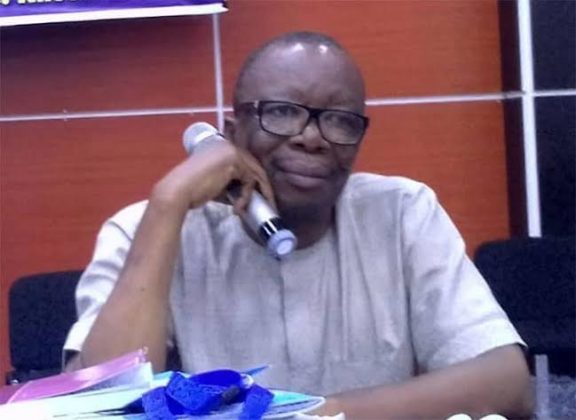Emmanuel Osodeke, president of the Academic Staff Union of Universities (ASUU), says the federal government cannot simply opt out of funding federal universities.
The academic was reacting to recent comments attributed to Tahir Mamman, the minister for education.
During an education conference in Abuja, the minister was reported to have said that the President Bola Tinubu administration would grant full autonomy to federal government-owned universities in the country.
The move will enable these public universities to source for funding through various means, in a bid to meet their financial obligations, he had said.
READ ALSO: President Tinubu nominates new CBN governor and management team
During a programme on Channel TV, Osodeke argued that the statement couldn’t possibly imply that the Nigerian government will opt out of funding federal universities.
“What I heard from him was that he has set up a committee to come up with a roadmap to revamp Nigeria’s education system. Our universities already have autonomy. It depends on your interpretation of it,” he said.
“There is no way the federal government would say they won’t fund universities. It’s there in the constitution, section 18 says university, primary, and secondary education are free.
Advertisement
“From what we’ve seen, I don’t think this government is going to hands-off on funding universities.
“But the autonomy law enacted in 2003 is there. If we follow it without interference from bureaucrats, universities will be fine.”
THE FUNDING CHALLENGE
In Nigeria, up to 95% of the budgetary allocation for federally-owned universities goes into paying salaries at rates that academics have repeatedly lamented are still inadequate and globally uncompetitive.
Advertisement
An inadequate 1% covers overheads, leaving federal varsities struggling to fund their day-to-day costs.
The main financial inflow available for capital projects in these public varsities comes from TETFund, which is serviced from a two percent education tax paid from the assessable profit of companies registered in Nigeria.
Osodeke addressed sentiments about the irony of ASUU advocating for administrative autonomy for public varsities, while unwilling to independently shoulder the responsibility of solving the funding problem at these universities.
“Are there no other autonomous bodies in this country? Are they funding themselves? Take the judiciary and the national assembly. Are they funding themselves?
“The Nigerian press is talking about financial autonomy, where is it happening in the world? Do you name the US? Do you know how much they pour into those universities as scholarships and grants?
“Do you know the budgetary allocation to universities? Nigerian students go to Germany and enjoy free tuition.
Advertisement
“What you’re saying about granting financial autonomy is that you’re privatising federal universities. Is that what we want and what taxpayers are saying? Nigeria’s finance belongs to Nigerians.”
Osodeke said if Nigeria commits what countries in West Africa and Europe are committing as budgetary allocation to education, the public university system would not have funding troubles.
“If you check the ratio of Nigeria’s education budget to our GDP, we have the lowest in the world at 0.5,” he said.
“I’ve heard the current president talk about committing a higher percentage to education and I hope we implement it.”
FEDERAL UNIVERSITIES NEED AN ANNUAL BUDGET OF ₦12BN TO RUN PROPERLY, SAYS ASUU
Nigeria’s public universities have seen repeated disruptions over the years, with striking lecturers protesting multiple grievances including funding deficits, poor conditions of service, and infrastructural decay.
Academic staff in public universities embarked on their 16th strike in 23 years which lasted for eight months in 2022.
In recent weeks, federal varsities have been hiking their fees over what stakeholders describe as a sustainability crisis.
This has sparked public outcry and student protests across campuses nationwide.
Osodeke said allocating up to N12 billion in the budget for overhead costs at federal universities will guarantee the proper running of these institutions.
“When you check our agreement, we have suggested other ways to fund the system because education is a public good. We’re saying they should listen to us so that we can sign and implement it. But they will not,” he added.
“If ASUU hadn’t come up with TETFUND in 1994, we wouldn’t have any public universities today in Nigeria.
“If UNN Nsukka, UI, and ABU get about N11 billion to N12 billion a year to run universities, won’t that solve a problem? Funding is a critical issue. The second is academics.
“The bulk of academics are leaving the country today because of what professors are being paid. A professor is paid about N400,000 and spends more than N100,000 on fuel to get to their office. They have to pay for their research.
“How will they survive? He goes to another country and is paid about N4 million a month. They are leaving.
“So we need to look at how we can pay a competitive wage that will enable our academics to stay and also allow non-Nigerians to come here and teach.”






















